Suchergebnisse
EnergyCityConcepts (ECC) - Methoden- und Konzeptentwicklung zur Implementierung nachhaltiger Energiesysteme in Städten am Beispiel von Gleisdorf und Salzburg
Im gegenständlichen Projektvorhaben werden anhand zweier konkreter Modellregionen (Kleinstadt Gleisdorf und urbanes Stadtquartier Salzburg-Schallmoos) neue methodische Herangehensweisen (interdisziplinäre Energieraumplanung, Modellbildung und Simulation) entwickelt und erprobt. Die beiden Modellregionen verbindet dabei das ambitionierte politische Bekenntnis zu einer 100 % erneuerbaren bzw. CO2-neutralen Energieversorgung.
ECC – EnergyCityConcepts – Development of a methodology and concept for the implementation of sustainable energy systems in cities by the example of Gleisdorf and Salzburg
In the context of this project two concrete model regions (small city Gleisdorf and urban city quarter Salzburg-Schallmoos) will be developed and tested with new methodical approaches (interdisciplinary urban and regional energy planning, modeling and simulation). An ambitious political commitment of both model regions is a 100% renewable or rather CO2-neutral energy supply.
Storage Cascade MZ: Storage cascade system to establish urban PLUS energy systems on the example of the city of Mürzzuschlag
In the "Storage Cascade MZ" project, battery storage systems are implemented on different grid levels in the city of Mürzzuschlag, whose measurement data enable an integrated grid monitoring and create the basis for a future expansion of the nominal power of photovoltaic (pv) systems.
Green facades with moss plants
Development of moss-covered facade panels by selecting and testing of appropriate moss species, new water storage and adhesive substratum, Materials of the support panels and technical construction details, for year-round green, sustainable, maintenance friendly, affordable building facades
VERTICAL FARMING - Ermittlung der Anforderungsbedingungen zur Entwicklung eines Vertical Farm Prototyps zur Kulturpflanzenproduktion
Im Mittelpunkt stand die Erforschung von Grundlagen für eine neue Gebäudetypologie, der Vertikalen Farm. Urbane vertikale Lebensmittelproduktion kann zur Steigerung der Energieeffizienz von und zur Reduktion des Landverbrauchs durch Städte beitragen. Wesentliche Einflussfaktoren zur Erreichung dieser Ziele werden durch diese Grundlagenforschung offen gelegt.
Site certificate
Possibilities and requirements of transferring the Swiss “2000-Watt Site” certificate to Austria
Energiemosaik Austria - Österreichweite Modellierung und webbasierte Visualisierung von Energieverbrauch und CO2-Emissionen auf Gemeindeebene
Inhalt des Projektes ist eine alle Nutzungs- und Mobilitätsarten umfassende Modellierung und webbasierte Visualisierung von Energieverbrauch und Treibhausgasemissionen aller österreichischen Gemeinden. Die Ergebnisse können in zahlreiche energie- und klimarelevante Handlungsfelder integriert und für die Sensibilisierung von Entscheidungsträgern und Öffentlichkeit genutzt werden.
Energy Mosaic Austria - Austrianwide modelling and web-based visualisation of energy consumption and greenhouse gas emissions on local level
The project consists of a modelling and a web-based visualisation of energy consumption and greenhouse gas emissions of all Austrian cities and municipalities considering all kinds of land use and mobility. The results deliver a sound basis for numerous energy and climate relevant fields of action and for awareness raising of decision makers and the public.
VERTICALurbanFACTORY: Innovative Konzepte der vertikalen Verdichtung von Produktion und Stadt
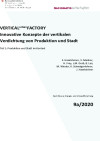
Das Projekt beforscht Möglichkeiten und Potenziale hocheffizienter Raumnutzung durch moderne Konzepte „gestapelter“ Funktionen und vertikaler Produktion.
Schriftenreihe
9/2020
E. Haselsteiner, V. Madner, H. Frey, L.M. Grob, B. Laa, M. Winder, K. Schwaigerlehner, J. Haselsteiner
Herausgeber: BMK
Deutsch, 253, 153 bzw. 52 Seiten
Downloads zur Publikation
Methoden- und Konzeptentwicklung zur Implementierung nachhaltiger Energiesysteme in Städten am Beispiel von Gleisdorf und Salzburg (ECC - EnergyCityConcepts)
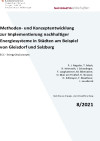
Im gegenständlichen Projektvorhaben werden anhand zweier konkreter Modellregionen (Kleinstadt Gleisdorf und urbanes Stadtquartier Salzburg-Schallmoos) neue methodische Herangehensweisen (interdisziplinäre Energieraumplanung, Modellbildung und Simulation) entwickelt und erprobt. Die beiden Modellregionen verbindet dabei das ambitionierte politische Bekenntnis zu einer 100 % erneuerbaren bzw. CO2-neutralen Energieversorgung.
Schriftenreihe
8/2021
P. J. Nageler, T. Mach, R. Heimrath, I. Schardinger, F. Langhammer, M. Biberacher, O. Mair am Tinkhof, H. Strasser, H. Edtmayer, F. Mauthner, I. Leusbrock
Herausgeber: BMK
Deutsch, 141 Seiten
Downloads zur Publikation
Monitoring Mehrfamilienhäuser "Tonpfeifengasse"
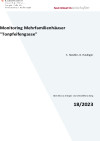
Messtechnische Begleitung und Bewertung der Funktionsweise von Bauteilaktivierung als Speicher für Umweltenergien am Beispiel der Wohnhausanlage Tonpfeiffengasse.
Schriftenreihe
18/2023
S. Handler, G. Haslinger
Herausgeber: BMK
Deutsch, 72 Seiten
Downloads zur Publikation
OPEN HEAT GRID - Open Heat Grids in urban hybrid systems
The primary research topic of OPEN HEAT GRID was to investigate the possibilities of enforcing the feed-in of industrial waste heat into existing district heating networks. The project results show that excess heat is not for free: despite minimal variable costs, the investment costs need to satisfy usual payback periods. The analysis shows that there is no need for a regulation in the sense of a feed-in obligation or market liberalization. However, from an economic point of view, information asymmetries exist, which may lead to irrational decisions.
DALEC - Day- and Artificial Light with Energy Calculation
Entwicklung eines Online-Konzeptanalysetool für ArchitektInnen, BauingenieurInnen, LichtplanerInnen und Bauherrn, welches trotz einer einfachen Handhabung und kurzen Berechnungszeiten, die komplexen lichttechnischen und thermischen Vorgänge in einem Gebäude abbildet und Heiz-, Kühl- und Kunstlichtbedarf anschaulich bewertet. Zudem wurde das Nutzerverhalten (z.B. Blendschutz) berücksichtigt und visuelle und thermische Komfortkriterien analysiert. Diese neuartige und innovative, gesamtheitliche Betrachtung ermöglicht eine nachhaltige und energieeffiziente Entwurfsplanung für Neubau und Sanierung.
Innovative Konzepte zur Versorgung großvolumiger städtischer Gebäude/Quartiere mit PV und Geothermie
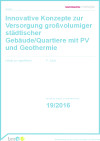
Schriftenreihe
19/2016
F. Zach
Herausgeber: BMVIT
Deutsch, 83 Seiten
Downloads zur Publikation
Digital transformation of the Austrian construction industry and its impact on employment
What are the impacts of the digital transformation of the Austrian construction industry on this sector’s labour market? By looking at the next five to ten years it will be analysed whether and to what extent digital applications lead to an increasing, falling or stagnant demand for employees in the construction industry and in construction occupations.
M-DAB2: Materialintensität der Innenentwicklung - Ressourcenbewertung und Lokalisierung städtischer Entwicklungspotenziale
Bei der Bewertung von Innenentwicklungspotenzialen wurde erstmals auch die Materialintensität der Innenentwicklung (anfallende Stoffmengen) für unterschiedliche Entwicklungsvarianten berücksichtigt. Dabei wurde ein Methodenset zur holistischen Bewertung von Potenzialflächen und verschiedene Entwicklungsvarianten und -szenarien zur ressourcenschonenden Innenentwicklung geschaffen.
REGOreal - 100% Erneuerbare Energie Region: Lokale Energie Gemeinwohl Oekonomie im Reallabor für vernetzte Energie- und Mobilitätszellen
In REGOreal geschieht die Sondierung für eine 100% Erneuerbare Energieregion im Raum Retz-Horn-Krems-Tulln (NÖ) sowie Mallnitz (Ktn). Es gibt vier Fokusthemen: 100 Erneuerbare Energie-Gemeinschaften (EEG), 1.000 Gebäudesanierungen, 10.000 Energie-Exporteure und -Exporteurinnen (im Sinne der Mitarbeiter:innen, welche den Ansatz ins private Umfeld tragen) und 100.000.000 km nachhaltiger Mobilität mit umfassender Nutzung von IT für die Entwicklung lokaler integrierter Energyiesysteme (IES) zur Einbindung eines bunten Mix unterschiedlicher Akteure und Akteurinnen und Objekte.
Monitoring of multi-family houses “Tonpfeifengasse”
Evaluation of activated building parts as heat storage for renewable energy shown on the example of the multi-family houses "Tonpfeifengasse".
Langzeitevaluierung des Energieverbrauchs von 100 energieeffizienten Gebäuden in Österreich als repräsentativer Querschnitt österreichischer Leuchtturmobjekte (LZE 100 Leuchtturmobjekte)
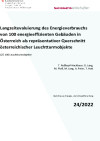
Erfassung, Auswertung und Analyse von Energieverbrauchsdaten von 100 energieeffizienten Gebäuden in Österreich über eine Betriebszeit von 3 bis 25 Jahren als repräsentativer Querschnitt der österreichischen Leuchtturmobjekte. Differenzierung nach Gebäudetypen, Energieträger und Ermittlung der realen Treibhausgas-Emissionen. Vergleich der gemessenen Verbräuche zu Benchmark-Werten.
Schriftenreihe
24/2022
T. Roßkopf-Nachbaur, G. Lang, M. Ploß, M. Lang, A. Peter, T. Hatt
Herausgeber: BMK
Deutsch, 143 Seiten
Downloads zur Publikation
DALEC - Day- and Artificial Light with Energy Calculation
In the course of DALEC an online concept evaluation tool for architects, building engineers, lighting designers and building owners was developed. Although easy to use, the software accounts for the complex thermal and light processes in buildings and allows a simple evaluation of heating, cooling and electric lighting loads. Not only energy, but also user behavior were considered (e.g. in terms of glare protection) and visual and thermal comfort were evaluated. This novel and innovative, holistic approach makes sustainable and energy efficient building design possible for new buildings as well as refurbishment.
